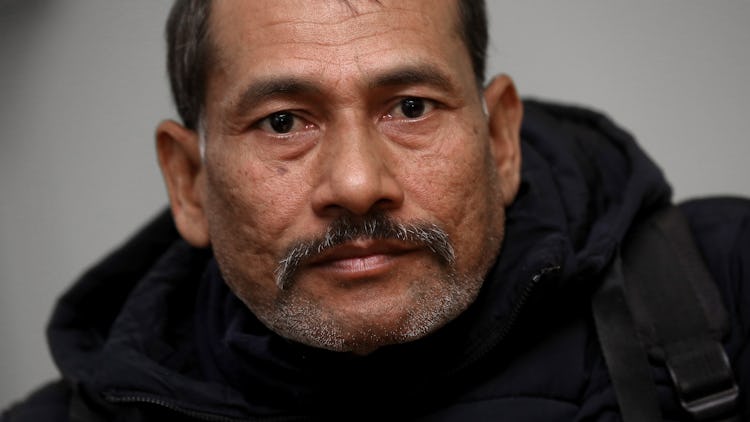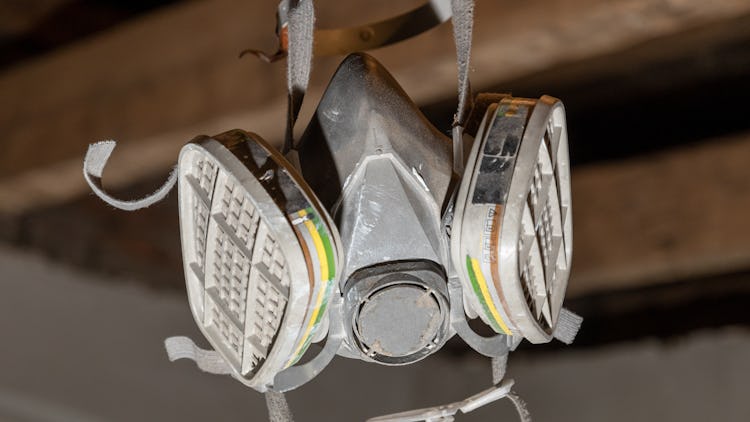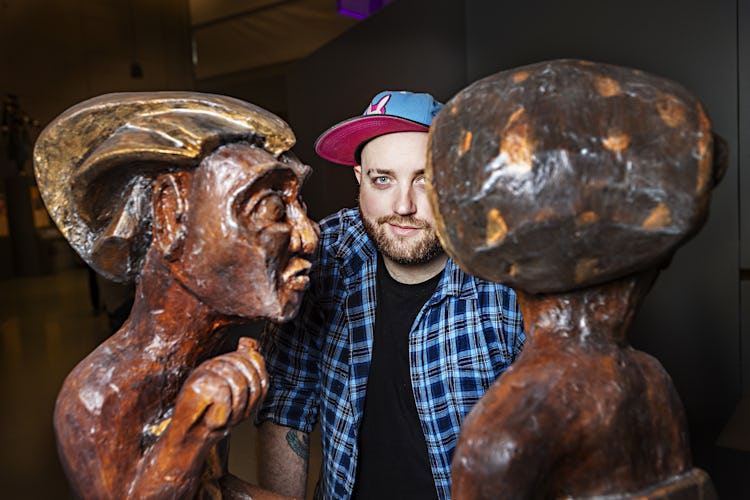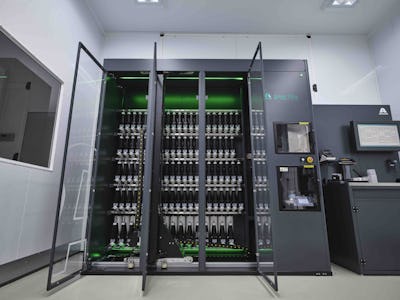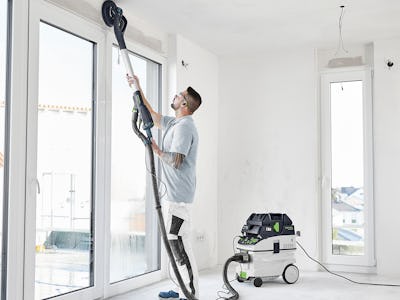Nepal: A Divided Labour Movement Is Uniting
The workers in Nepal don’t think that a country like Sweden exists. They wonder at the fact that we don’t work every day of the week, and that we get to have paid vacations. To them, work is necessary in order to put food on the table. Taking a day off equals hunger.
Within the country's labour movement, however, word is spreading about “the new era” – a development that is starting to accelerate after many years of struggle for democracy.
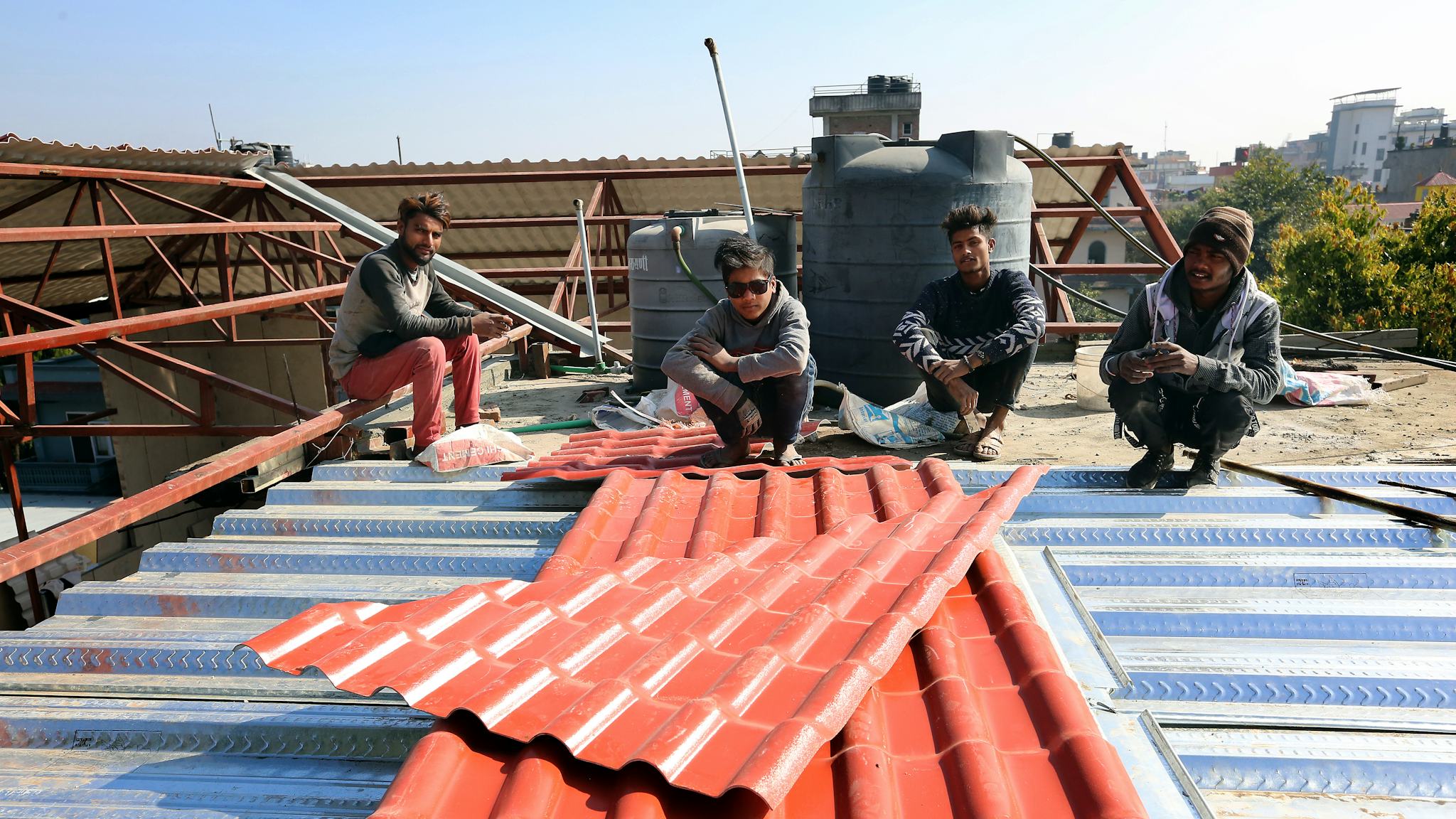
Facken i Nepal pratar om ”the new era” en utveckling som börjat ta fart efter många år av kamp för demokrati.
(For the original Swedish version, click here.)
During our visit in the Nepalese capital Kathmandu, we attend meetings arranged by the country’s trade unions. Despite the fact that the workers miss out on salary, they attend as well – to receive information, hope and solidarity.
We meet Siya Ram Sha who, despite having to return to work, stays when I ask him what he can tell me about being a painter in Nepal. When he starts talking about his life he lights up with pride and kindness.
Despite the difficult circumstances in the poor country of Nepal, hard work has permitted him to manage quite well. He has a small house of his own that he has built himself. His wife and three children, however, remain in his home village – six hours away.
They still live there, managing a small farm and taking care of his parents. Siya Ram Sha is able to return home four to six times a year.
– I can’t allow myself to be selfish. We need money, so I work, he says.
For 25 years he has been living and working in Kathmandu. He earns 1000 Rupees a day, which barely equals 100 Swedish Crowns (or ten USD). The minimum wage in Nepal is 517 Rupees.
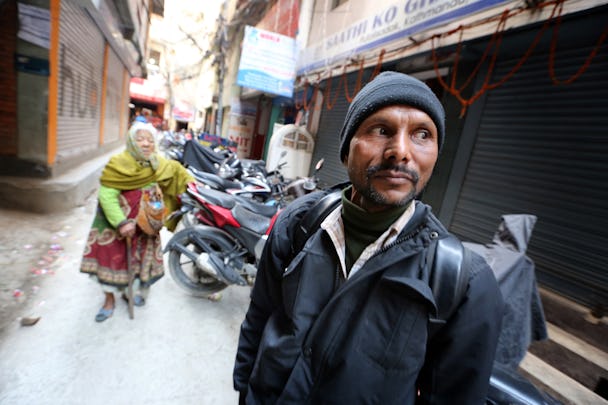
We have many problems. Of course I talk to my colleagues about the union. Together we can make a difference.
He doesn’t have any set working hours, and sometimes his days are very long.
– If there’s no work, that day becomes our day off, he says.
Siya Ram Sha tells us that he prays to God for every painter to always have access to employment.
– I recently joined the union. Thanks to that I’m able to share experiences with others, and I know many things now that I did not know before.
We get to come with him to his workplace, which consists of two buildings meant to become a college. He shows us around and we step over building materials and dust. Several professions work side by side here. We encounter a painter standing on top of a plastic barrel, a shawl wrapped over his mouth and nose in order to protect him from the harmful oil paint fumes.
The workers don’t have access to water or restrooms. They’re being discriminated against, but are not always aware of it. They don’t know what demands to make.
When it comes to workers’ rights we are united and work together. This is a huge advancement, which has been made largely thanks to LO and BWI-NAC.
– We have many problems. Of course I talk to my colleagues about the union. Together we can make a difference, Siya Ram Sha says.
We visit another workplace – the construction of a house supposed to be ready for inhabitants in four months. From what we can detect, the air seems to contain high levels of rock dust, since rock and concrete is being polished here and the workplace is not being cleaned.
The government has decided to ban paints containing lead. Other than that, things are not regulated here as they are in Sweden – and there is no way to find out what the products contain.
– Indoors we mainly use water based paints, but when working on steel constructions we have to use oil based ones, says Bishnu Gautam.
– When working outdoors we often use protective gear, but indoors that’s impractical, says Suraj Magar.
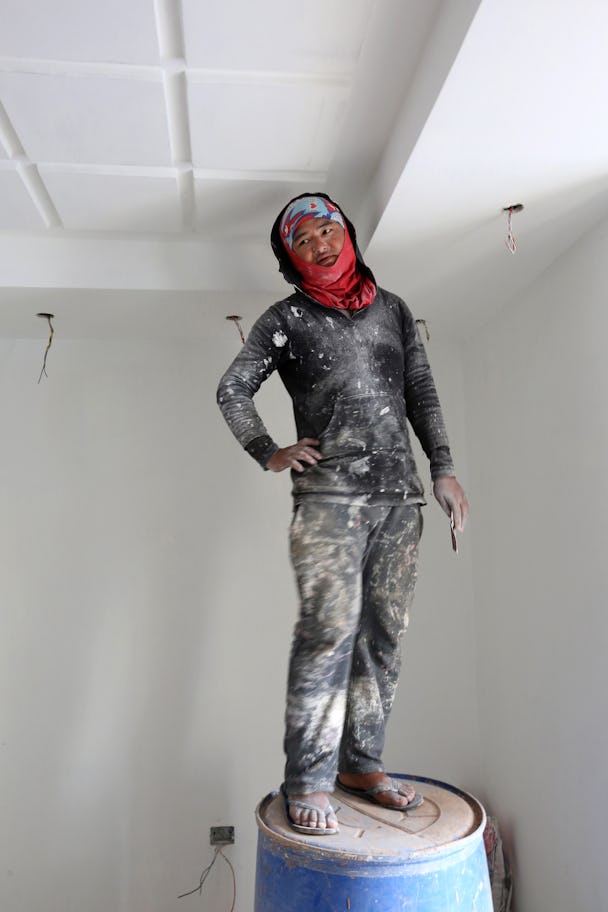
Nepal doesn’t have Sweden’s broad selection of gear, and they have never tried the more practical gloves that exist there.
They work eight hours a day, seven days a week. Five painters are working on this construction site, and they have one month to finish.
The choice of treatment methods is mostly up to the client. In this case, the owner of the building has detailed the desired end result, and then left it for the painters to decide.
While Sweden has a 150 year long tradition of labour movements, in Nepal unions have only existed for 30 years – and not until recently did the citizens succeed in their struggle for democracy.
The union representatives we meet tell us about the success they experienced in 2018 when, after their 16 year long campaign, the government instated a system for social security. Not all the parts are in place yet, but safety nets already exist for areas like healthcare, accidents and retirement pensions.
– Now there’s a framework and a law. That’s progress, but the work for everyone to be included continues, says J.B Gurung, president of CAWUN – one of the unions organizing workers within the building sector.
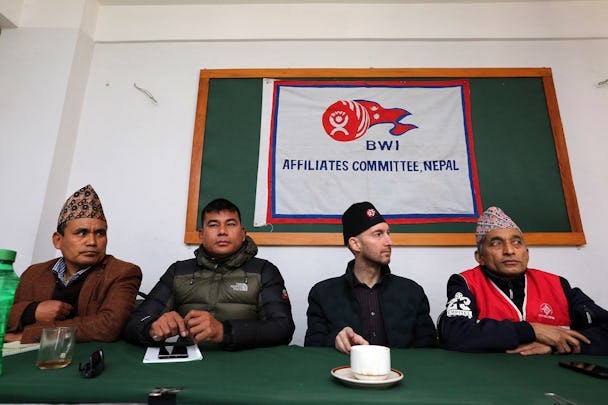
Without the support from LO-TCO and, later, other international unions, we would never have managed this campaign for the social security system.
The workers think that the social security system and, for example, its retirement pensions only apply to white collar workers. The unions need to reach out and make the construction workers understand that it applies to them as well.
Retirement pensions start at the age of 60 for those who have contributed to the fund for 15 years. 31 percent of the monthly salary has to be contributed. The employer is supposed to cover 20 percent, and the employee stands for the remaining 11 percent.
– Without the support from LO-TCO and, later, other international unions, we would never have managed this campaign for the social security system, says Naranath Luitel, president of the construction workers’ union CUPPEC.
Now the fight continues to make companies take their responsibility in registering their employees and pay the fee.
In Nepal, the same professions are organized by several separate unions with differing political alignments. I provoke some emotions in the room by asking if the government is worker friendly, and if it practices good labour market politics. Opinions on this subject turn out to be divided.
We’ve got 30 percent women in the educational programmes as well, which helps in making sure that there are women who can join the board.
– But when it comes to workers’ rights we are united and work together. This is a huge advancement, which has been made largely thanks to LO and BWI-NAC (the Nepalese section of the global construction workers’ union), Naranath Luitel says.
The international organizations have been pushing for greater unity amongst the unions, and now GEFONT (the equivalent of LO) and the central organization ANTUF (with origins in the communist party) are planning to merge in 2020.
Equality work is being prioritized – partly due to decisions made during the latest BWI congress, but also because of the ambitious equality objectives of the Nepalese workers’ movement. 30 percent of the leaders and elected representatives of the different organizations are women.
– We’ve got 30 percent women in the educational programmes as well, which helps in making sure that there are women who can join the board. In our women’s programmes, on the other hand, 30 percent of the participants are male, says Shanta Basnet of CUPPEC.
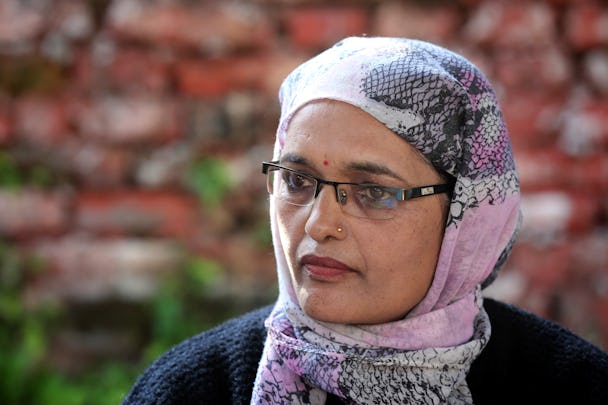
If I were able to read and write I would have a better job. Then my husband might not have left me and my son. But I’m good at my job.
The women we meet testify about harassment and discrimination in the workplaces. They are subjected to sexual harassment, less payment and fewer possibilities.
Radhika Devkota is the woman who painted the building used for union related education. In her subsequent workplace she fell from a defective working platform and injured her arm. When we meet her, she has only just recently been able to return to work.
– If I were able to read and write I would have a better job. Then my husband might not have left me and my son. But I’m good at my job, she says.
She tells us that the men didn’t teach her the job, so she watched them work in order to learn on her own. To her, the union represents something very special.
– My organization is my family, she says.
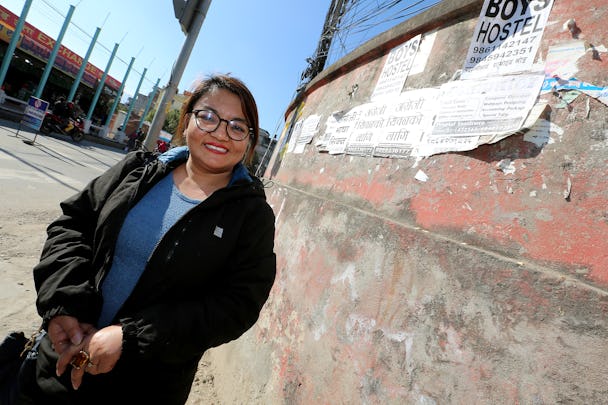
The social security system is a dream come true. We know from your world that it is possible.
– Solidarity is important. When we see how things work in Sweden we think: Why not here, but in our own way, says Smritee Lama of the builder’s trade union CUPPEC.
The Swedish Painters’ Union has had a commitment in Nepal for a long time. The Nepalese unions welcome the Swedish delegates not as guests – but as family.
Today this commitment is part of the international work done by the Swedish Painters’ Union together with BWI (Building and Wood Worker’s International) and the Swedish unions’ development aid agency Union to Union.
– The social security system is a dream come true. We know from your world that it is possible, Smritee Lama says.
The Nepalese unions talk about “the new era” – a development that is starting to accelerate after many years of struggle for democracy.
CUPPEC dream about training painters. Nepalese workers need certification to prove their competence and demand proper payment. They have seen how things work in Sweden.
In Nepal, workers are viewed as second rate citizens.
That’s how things were in Sweden 150 years ago, but through unionization and vocational training construction workers have gained status.
– That’s how things were in Sweden 150 years ago, but through unionization and vocational training construction workers have gained status, says Niklas Holmqvist, international project manager of the Swedish Painters’ Union.
The Nepalese unions engage in improving workers’ rights and working environment, inspired by Sweden. Fundraisers amongst the members have made it possible for CUPPEC to build a house to use for union related courses.
Several big construction projects are underway in Nepal. Houses, freeways and infrastructure. Hydro power is being developed, and the country is about to receive its first railroad.
Hopefully more and more Nepalese workers will be able to find employment in their home country. The efforts to organize the workers and secure fair employments must never cease.
Our coverage from Nepal was financed by Union to Union, which organizes the international union development collaboration of Saco, TCO, LO and their affiliated associations.
Photography: Tomas Nyberg
Interpretation: Prerna Prasad Santoshi, Rajeev Sharma, Smritee Lama
Reporter: Helena Forsberg
Translation: Chris Smedbakken
